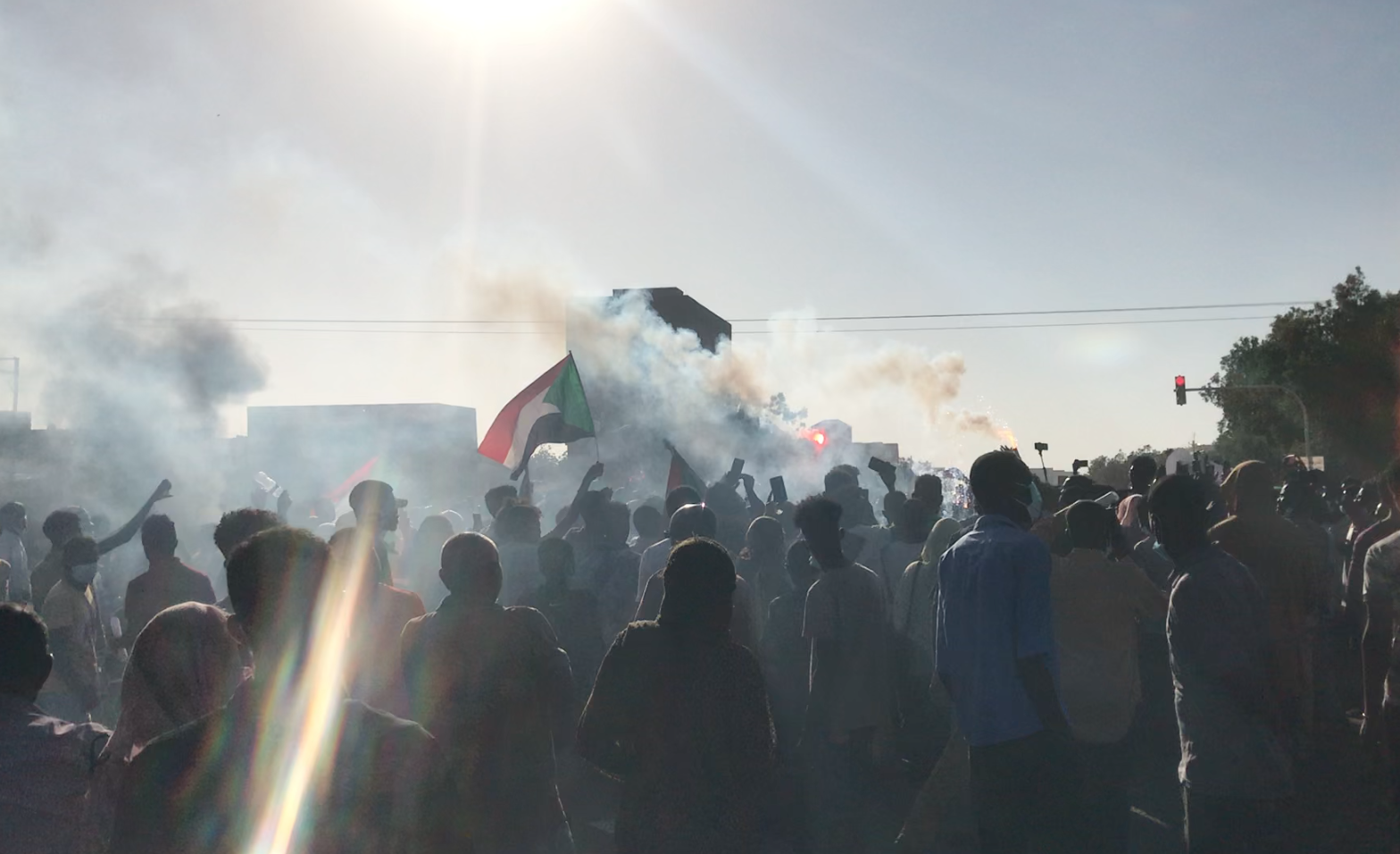Debating Ideas aims to reflect the values and editorial ethos of the African Arguments book series, publishing engaged, often radical, scholarship, original and activist writing from within the African continent and beyond. It offers debates and engagements, contexts and controversies, and reviews and responses flowing from the African Arguments books.
Youth from heterogeneous social and political backgrounds played an important role as the backbone of street protests in Sudan’s 2018/19 revolution. During the revolution, many young people took the identity of being thawrī [1] (a revolutionary).
The collective form thūwār (revolutionaries) pointed towards the youth’s steadfastness and stamina to keep up the resistance. For some, it meant not only opposing authoritarian tendencies within the dictatorship and military forces but even their own families, who had not wanted them to join the protests.
Being revolutionary became increasingly connected to collective action on the street. Finally, the three-month-long sit-in in front of the military headquarters in Khartoum in 2019 marked a new beginning for many young people. Thūwār generated intersubjective affects and emotions, such as feelings of power, pride, victory, hope, responsibility, and entitlement. Connected to endless heroic stories of the revolution, the identity thūwār granted the youth an intelligible political subject position.
It is thus no surprise that the thūwār took to the streets in masses only hours after the military staged a coup d’état in October 2021 that overthrew the transitional government. Protestors quickly adopted the Three Nos [2] of the resistance committees: no legitimation, no partnership, no negotiation (with the coup plotters). For over a year, youth protested at least weekly to voice their rejection of military and militia. Many young people saw their mission as toppling the putschists and establishing civilian rule.
They meant to once and for all break with the political economy of war and the impunity of those committing crimes against humanity and therewith fulfil the key demands of the revolution: freedom, peace and justice.
For this, they were backed by much of the broader society, including political elites such as members of the Forces of Freedom of Change (FFC). But the reconstitution of the resistance movement had sharpened political demands. They now not only revolted against military rule, but also elitist and corrupt politics of a centre that exploits the periphery and leaves the majority of people out of political processes.
Having witnessed the developments of the transitional period, the movement was now widely critical of the politics of these elites. A year into the coup, the sentiment in Khartoum had changed. Rapid economic decline and a political deadlock led to growing frustration and disappointment.
When the political coalition of the FFC declared negotiations about a new framework agreement with the military in autumn 2022 [3] , almost no one spoke about the power of the youth. Instead, binary old buzzwords, such as hubūṭ nāʿm (soft landing) and jadharī (radical), operating along a disjunctured political spectrum, conquered public discourse. Hubūṭ nāʿm was well- known as a political strategy centring on a political process led by political elites and supported by international diplomats.
Had the street protests initially suited the political agenda of the elites, they were now seen as complicating negotiation of the soft landing process because protestors rejected the framework agreement. As public sentiment shifted from initial euphoria supporting the protests to increasing hopelessness, the discourse about the framework agreement was increasingly polarised.
Narratives appeared in which both sides, supporters and detractors of the agreement, negatively framed each other. This also affected protestors. Initially associated with political fractions between the FFC and the Sudanese Communist Party (SCP), the division between radical and soft-landing positions resulted in a framing that operated beyond the sphere of rhetoric.
Both labels came with broader attributions and evoked certain feelings and emotions triggered by the affected’s personal and political backgrounds. Having conducted 11 months of ethnographic research (2021–23) on street protests in Khartoum, I will briefly analyse the affective meanings and experiences these labels entailed for youth protestors. Due to the limit of words, I will not delve into the social and political complexities that underpin these labels. That being said, these terms’ manifold historical, social, and political interconnections require further analysis.
A radical was considered a transgressor who wanted to stop political development. This was due to the term’s association with the SCP, which was widely contested, for example for calling to topple the transitional government which came into power after the fall of the old regime in 2019. Thus, radical evoked negative historical emotions and often came with degrading ascriptions, such as jadharī bas (just a radical) or jadharī saī (a random radical).
Because of this, narratives of youth radicals as immature and manipulated by the SCP, thus incapable of political thinking, judgement, or decision-making, came into being. In contrast, my interlocutors identifying as radicals mostly distanced themselves from the SCP. Although prone to leftist political ideas, they were highly critical of the party.
One explained the imputation of being manipulated by the SCP: “In Sudan, you just have to say the word ‘social justice’ and people will accuse you of being a communist.” They instead thought of radical as radical change that altered the entire social and political structure of the country. A settlement was thus seen as ending the revolution.
This article is an opinion that has been shortened. It was originally published on 16 November 2023 on africanarguments.org


 Download PDF
Download PDF
